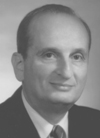Nelson Cardiovascular Research Lecture
- Department of Physiology
- About Physiology and Biophysics
-
Education
- Melissa and Pete Shepherd, Jr., PhD New Investigator Prize
- Physiology and Biophysics Educational Programs Home
- Graduate Program
- Undergraduate Research Experience
- Seminar and Lecture Series
- Seminar Series Archives
-
Research
- 2026 Publications
- 2025 Publications
- Physiology and Biophysics Research Home
- Core Facilities
- Programs
- Graduate Program Research
- Publications
- Research Links
- Resources
M. Judah Folkman, MD
Thursday, Nov. 18, 1999
University of Mississippi Medical Center, Room R153

Dr. Judah Folkman received his BA from Ohio State University and his MD from Harvard Medical School.
He began his internship and residency training in surgery at Massachusetts General Hospital, serving as chief resident in surgery. He was professor of surgery at Harvard Medical School and surgeon-in-chief at Children's Hospital Medical Center in Boston, becoming the Julia Dyckman Andrus Professor of Pediatric Surgery.
Before assuming full-time chairmanship for the Department of Surgery at Children's Hospital, Dr. Folkman served for six months as chief resident in pediatric surgery at the Philadelphia Children's Hospital under Dr. C. Everett Koop. During his 14-year tenure as surgeon-in-chief at Children's Hospital, Dr. Folkman began his major laboratory effort on the study of angiogenesis, and in 1981, he stepped down from the chairmanship in surgery in order to devote his full effort to research.
Dr. Folkman's discoveries on the mechanism of angiogenesis opened a field of investigation now pursued worldwide. His laboratory reported the first purified angiogenic molecule and the first angiogenesis inhibitor, proposed the concept of angiogenic disease, and has begun clinical trials based on this research. Folkman's hypothesis that solid tumors are angiogenesis-dependent initiated studies of angiogenesis in tumor dermatology.
He developed almost all of the methodology for this field, including the first cloning and culture of capillary vivo bioassays. He elucidated the sequential steps of capillary growth. To explain the development of three-dimensional tubular networks, he proposed a linkage between cell shape and growth control, now a separate field currently understood in terms of the elements. Basic fibroblast growth factor (bFGF), was first purified in Folkman's laboratory (by Michael Klagsbrun and Yuen Shing). It is the first of 14 angiogenic molecules which have now been sequenced and cloned in other laboratories.
Folkman predicted the existence of natural angiogenesis inhibitors and subsequently discovered the first of these, angiostatic steroids, as well as two other families of inhibitor molecule. A clinical trial on life-threatening hemangioma is underway at Children's Hospital and at other centers. Other angiogenesis inhibitors are currently in clinical trials in the U.S., U.K. and Europe. The possibility of anti-angiogenic therapy is now on a firm scientific foundation, not only in the treatment of cancer, but of many non-neoplastic diseases as well.
His many awards and honors, too numerous to list, include Fellow of the American Association for the Advancement of Science, Sheen Award from the American College of Surgeons and a member of the National Academy of Sciences "for founding the field of angiogenesis research."
He was also elected to the Institute of Medicine of the National Academy of Sciences. He also received the Gairdner Foundation International Award, from Canada; Christopher Columbus Discovery Award in Biomedical Research from the National Institute of Health; 3M Life Sciences Award from the Federation of American Societies for Experimental Biology; Wolf Prize in medicine from Israel; Distinguished Lifetime Achievement Award from the World Congress on Cell and Tissue Culture; Mike Hogg Award from the M.D. Anderson Cancer Center; Medal of Honor from the American Cancer Society; and the Bristol-Myers Squibb Award for Distinguished Achievement in Cancer Research.


